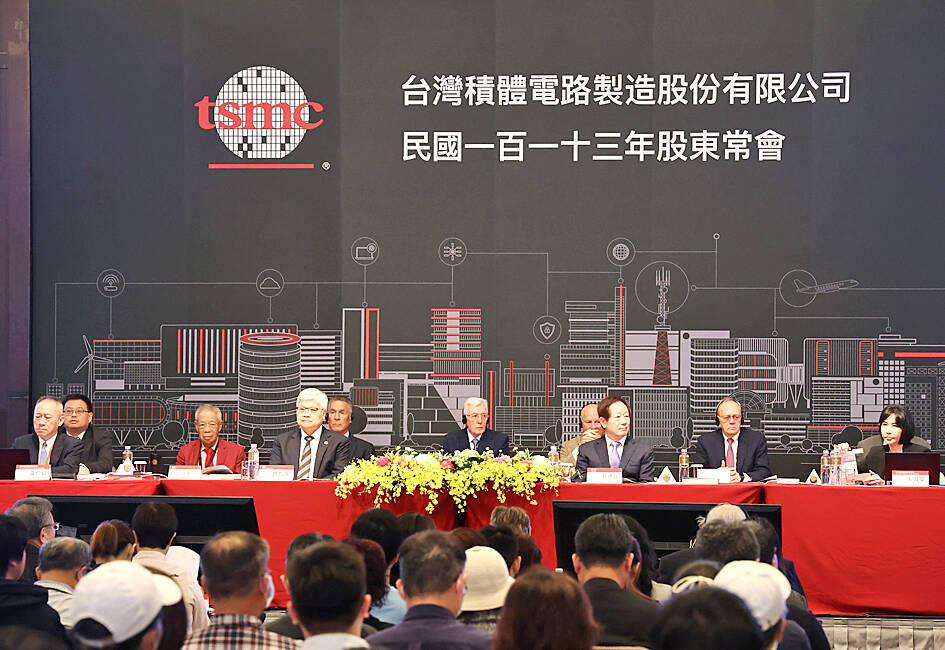Taiwan Semiconductor Manufacturing Co (TSMC, 台積電), the world’s biggest contract chipmaker, yesterday said it is optimistic about its business outlook over the next few years, benefiting from the uptake of artificial intelligence (AI) applications.
TSMC produces AI chips for a majority of AI chip designers from Nvidia Corp to Advanced Micro Devices Inc (AMD), using its cutting-edge process technologies, including 3 nanometers, 4 nanometers and 5 nanometers.
“We are optimistic about AI. [Demand] is really hot. Besides, AI applications are just in its infancy. More and more AI applications will be used in our daily lives,” TSMC chief executive officer and new chairman C.C. Wei (魏哲家) told a media briefing. “TSMC’s [business] outlook for the next few years will be very optimistic.”

Photo: CNA
TSMC’s board of directors yesterday tapped Wei to succeed Mark Liu (劉德音), who served as company chairman for the past six years.
Since there would be a wide spectrum of AI applications for different vertical industries, Wei said he could not agree more with Nvidia Corp CEO Jensen Huang’s (黃仁勳) bullish view about AI growth, Wei said.
The AI market would swell to US$100 trillion, Huang estimated.
TSMC would be a major beneficiary of this AI boom, given its technology leadership, Wei said.
Because of its strong technological capabilities, TSMC occupies a “very advantageous position,” Wei said.
That means “no one can compete with us so far — and we intend to maintain such an advantageous position,” he added.
Asked about a South Korean media report that Samsung Electronics Co is catching up with TSMC and nibbling on its turf, Wei said his company has no rival so far and doubted the publication’s trustworthiness.
TSMC has overtaken Intel Corp in offering the world’s most advanced foundry technology since 2018, when it rolled out 7-nanometer process technology.
Since then, the Taiwanese company has safeguarded its technology leadership position. The chipmaker plans to start mass production of 2-nanometer chips next year, ahead of its competitors.
“Since we continue advancing our technology ahead of [competitors], they have to adopt our technology,” Wei said. “TSMC does not develop any technology only for certain products or certain industries.”
The company’s secret formula behind its long-term technology leadership is that TSMC is always making progress, Wei said. That is why TSMC has an advantage over its competitors, he said.
Asked whether customers have asked TSMC to relocate its production outside of Taiwan because of escalating tensions between Taiwan and China, Wei said: “It had been discussed.”
However, it would be impossible to move all of the company’s production abroad, as 80 to 90 percent of its manufacturing capacity is based in Taiwan, he said, adding that he believed there was little chance of war.
Talking about the company’s approach to selecting the next leader, Wei, 71, said the company is working on a succession mechanism to ensure the company operates smoothly.
Whoever succeeds him should share the company’s values of maintaining its technological leadership, expanding capacity and winning customers’ trust, Wei said.

SETBACK: Apple’s India iPhone push has been disrupted after Foxconn recalled hundreds of Chinese engineers, amid Beijing’s attempts to curb tech transfers Apple Inc assembly partner Hon Hai Precision Industry Co (鴻海精密), also known internationally as Foxconn Technology Group (富士康科技集團), has recalled about 300 Chinese engineers from a factory in India, the latest setback for the iPhone maker’s push to rapidly expand in the country. The extraction of Chinese workers from the factory of Yuzhan Technology (India) Private Ltd, a Hon Hai component unit, in southern Tamil Nadu state, is the second such move in a few months. The company has started flying in Taiwanese engineers to replace staff leaving, people familiar with the matter said, asking not to be named, as the

The prices of gasoline and diesel at domestic fuel stations are to rise NT$0.1 and NT$0.4 per liter this week respectively, after international crude oil prices rose last week, CPC Corp, Taiwan (台灣中油) and Formosa Petrochemical Corp (台塑石化) announced yesterday. Effective today, gasoline prices at CPC and Formosa stations are to rise to NT$27.3, NT$28.8 and NT$30.8 per liter for 92, 95 and 98-octane unleaded gasoline respectively, the companies said in separate statements. The price of premium diesel is to rise to NT$26.2 per liter at CPC stations and NT$26 at Formosa pumps, they said. The announcements came after international crude oil prices

DOLLAR SIGNS: The central bank rejected claims that the NT dollar had appreciated 10 percentage points more than the yen or the won against the greenback The New Taiwan dollar yesterday fell for a sixth day to its weakest level in three months, driven by equity-related outflows and reactions to an economics official’s exchange rate remarks. The NT dollar slid NT$0.197, or 0.65 percent, to close at NT$30.505 per US dollar, central bank data showed. The local currency has depreciated 1.97 percent so far this month, ranking as the weakest performer among Asian currencies. Dealers attributed the retreat to foreign investors wiring capital gains and dividends abroad after taking profit in local shares. They also pointed to reports that Washington might consider taking equity stakes in chipmakers, including Taiwan Semiconductor

A German company is putting used electric vehicle batteries to new use by stacking them into fridge-size units that homes and businesses can use to store their excess solar and wind energy. This week, the company Voltfang — which means “catching volts” — opened its first industrial site in Aachen, Germany, near the Belgian and Dutch borders. With about 100 staff, Voltfang says it is the biggest facility of its kind in Europe in the budding sector of refurbishing lithium-ion batteries. Its CEO David Oudsandji hopes it would help Europe’s biggest economy ween itself off fossil fuels and increasingly rely on climate-friendly renewables. While